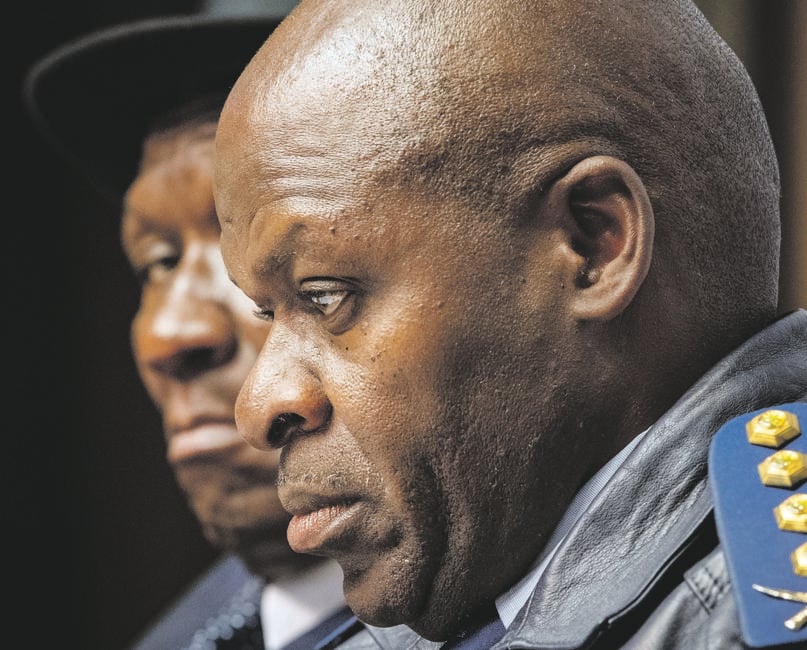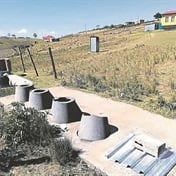
National police commissioner General Khehla Sitole describes himself as a “creativist”, a word mentioned many times during our two-hour interview to mark just over a year since he assumed office.
He may have designed as many as 500 crime prevention strategies in his three-decade career, he says, just for fun.
“I do not accept the world as it is. Some call me a strategist. I spend 90% of my free time designing strategies,” he says.
Much of this is done at home on a plot in Emalahleni, Mpumalanga, where he farms cattle and goats. Having been reluctant to move to Pretoria, he continues to live on his smallholding with his wife and grandchildren.
He may be in the hot seat, but for Sitole, this is not a job he bagged thanks to his 32-year track record; it is more of an ordination.
“I believe in anointment. God does not want untested material. There is nothing hot about it,” says the first career cop to lead the SA Police Service (SAPS) since 1999.
Almost weekly announcements of a cash heist gang being smashed here, a smuggling syndicate unravelled there or a drug syndicate bust in places from farms to security estates, are providing some hope for crime-weary South Africans.
“When you want to fight crime successfully, you must study the modus operandi of the criminals. I established a Modus Operandi Analysis Centre because criminals come with different methods. One of these was the flow of explosives from Zimbabwe,” he says.
The centre deploys crime analysts to scenes and if the criminals have come up with new tricks, a message is sent to the police’s training and development research unit to devise a new curriculum and training methods for officers.
The idea has been replicated in Ghana, which has also introduced the centre under SAPS mentorship.
Asked if this was his best achievement so far, Sitole says: “I can say it is one of the highlights of my job. Ghana said this centre is working wonders in reducing crime in their country.”
Sitole also introduced the 72-hour activation plan to catch suspects after a major crime is committed – which, he says, has improved in many cases to 48 hours.
“A criminal is like a lion in the bush. When the lion is in its territory and you throw a stone at it, it will go out when it does not see the direction the stone came from. The same applies to criminals. They would want to do crime but do not want you to know their methods or to surprise them,” he says.
“The 72-hour activation has been a surprise. Within 72 hours, criminals are arrested and money, firearms and vehicles recovered.
“Then police started clamping down on certain crimes in 48 hours, and in some instances, within an hour. Eventually, the 72-hour activation then improved. Criminals were intercepted and arrested while planning, and they retreated. That is how the cash heists were stabilised.”
The “last damage” to criminals, Sitole says, was a “wanted suspect matrix approach”, through which 30 most wanted criminals were identified and screened, and 80% were arrested.
“This was a syndicate of cash heists operating in Gauteng, Limpopo, Mpumalanga, the Free State and the North West. The big fish and designers have gone to jail.
“Cash heists have been sporadic in the Western Cape and KwaZulu-Natal because they check and target vulnerable places,” he says.
Cold case strategy
Another of Sitole’s plans has been to crack cold cases, including political killings and the murder of former Bafana Bafana goalkeeper Senzo Meyiwa. Sitole is reluctant to provide details about progress in Meyiwa’s case.
“The majority of cold cases are bought,” he says. “Criminals buy police and justice officials. Now we do cold case analysis at the centre.”
Sitole says there are about 10 000 convicted criminals, some sentenced to 75 years in prison, walking free after exploiting loopholes in the justice system. Police close their file after a criminal is convicted, but during the lengthy appeals process during which they could be granted bail, police are unaware that they are back in the community.
“Even when the appeal is denied, the convict is not in court because it is the lawyers who are arguing his case. A notice is issued for him to hand himself over, but the department of correctional services does not know this and it does not happen,” he says.
Unconventional methods
Sitole says he believes in sharing information with neighbouring countries and empowering communities. He also introduced the traditional policing concept where indunas are trained as police reservists.
“The strength of the traditional policing concept is that we see traditional leaders as being instrumental in upholding the moral fibre of society. The justice system gets involved and they are made aware of things that fall outside of their jurisdiction,” Sitole said.
Other strategies include his youth crime prevention strategy, introduced in the Western Cape.
“Young people are both the victims and perpetrators of crime, and when we bring them to the fore of crime prevention, we hit two birds with one stone.
“Angola is at an advanced stage when it comes to implementing this strategy, which squeezes the space for criminals because it places the young person out of their reach,” Sitole says, adding that this helps target the criminal underworld and syndicates.
Sitole says that when he became commissioner, syndicates were undermining the police. In the Western Cape, they were contributing to children’s education and supporting families in exchange for protection.
“With this method, you will never know that we are investigating you. It is a take-down approach. One guy had a farm and had drugs hidden under trees. Another take-down was discovering a farm that had three machines producing 16 mandrax pills a second. We have also found a drug-manufacturing factory within an access-controlled estate,” he says.
Rebuilding the police
The success of the 72-hour activations would not be possible without the crime intelligence unit, the repair of which was Sitole’s first priority. The technology used by the unit is being reviewed to capacitate it further.
But tension remains between the police and the Independent Police Investigative Directorate (Ipid), whose boss, Robert McBride, was informed by Police Minister Bheki Cele this week that his term would not be extended beyond February.
Last year, Ipid took Sitole to court for refusing to declassify documents needed for three corruption cases. Sitole said in court papers that those documents contain “intelligence information that might compromise national security and the identities of the operatives of the intelligence community”. But McBride responded that the documents did not constitute intelligence information.
Sitole denies that there is bad blood. He insists that he has been proactive in approaching Ipid and was working well with the directorate and National Treasury to root out tender crime within the police.
“The conflict of understanding and interpretation of legislation does not necessarily amount to a fight or the deterioration of relations. If there is a decision that I have to make to support Ipid, I will make it through following the legislation,” he said.
“The fact that we sometimes see things differently does not amount to conflict.”
Sleepless nights
Despite early successes, crimes including murder, house robberies and cash heists keep him awake at night on his Emalahleni smallholding.
In his spare time, he watches soccer, which he played as a young man. A fan of Muhammad Ali, he follows boxing and wrestling, and also watches films.
But his favourite way of relaxing is devising policing strategies, which he says occupies 90% of his spare time.
“I also use the behaviour of animals to devise them,” he repeats, adding that the go-getting nature of a lioness and the ability of a dolphin to cross oceans have featured in some of his initiatives. “There is no better way for my brain to relax than to devise strategies. The quiet of the smallholding allows me to think.”




 Publications
Publications
 Partners
Partners








